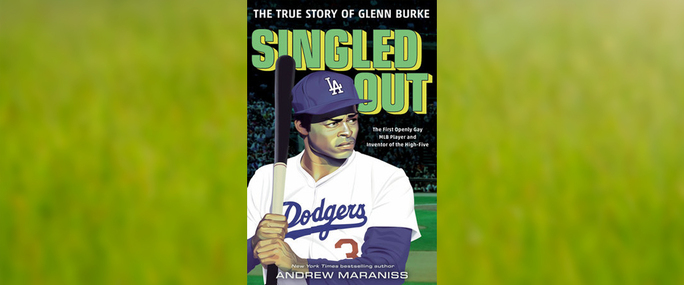Gays deserve credit for a number of cultural innovations: disco, InstaThots, overly groomed pets. But did you know the high five is also part of the list? Glenn Burke was the inventor of the now-universal gesture, first clasping palms with Los Angeles Dodgers teammate Dusty Baker after he had hit his 30th home run of the 1977 season. Burke raised his hand over his head as Baker jogged home from third base, and boom, the high-five was born. The reason you probably don’t know this is because…
Burke’s sexuality torpedoed his career
There is an understandable disconnect between gay culture and sports. For many, the fields represent exclusion and bullying, as well as toxic masculinity. But those perceptions no longer match the reality. At Outsports, we tell stories every day of brave LGBTQ athletes, nearly all of whom are embraced by their teammates. They are trailblazers in their communities, living unapologetically gay lives in traditionally conservative spaces.
Burke was one of the first athletes to do that, and his shamefully under-told tale is being chronicled by Andrew Maraniss in new book Singled Out: The True Story of Glenn Burke. Whether we like it or not, pro sports is a multibillion-dollar enterprise that helps set our cultural tone. True progress in the LGBTQ space wouldn’t be possible without sports.
It’s taken many decades but we are finally getting there, and it’s thanks to trailblazers like Burke. It doesn’t take baseball knowledge to celebrate someone paving the way.
Burke’s sexuality torpedoed his career. He didn’t conform to Major League Baseball’s atavistic norms, rejecting a $75,000 offer from the Dodgers to get married. Shortly thereafter, he was traded to the Oakland A’s. Manager Billy Martin infamously introduced him with, “Oh, by the way, this is Glenn Burke and he’s a faggot.”
Unsurprisingly, Burke spent two years on the bench. Then the A’s released him.
While Burke didn’t publicly come out as a player, his teammates knew he was gay. They say it wasn’t a problem. Burke was one of the most-liked guys on the squad. “It didn’t matter if he was gay or not,” teammate Davey Lopes told the Los Angeles Times in 2013. “No one cared.”
He thrived as an openly gay man, winning medals in the Gay Games and tearing up Castro Street
But management thought otherwise. Most notably, legendary Dodgers manager Tommy Lasorda was a virulent homophobe. He never acknowledged his own son’s gay identity, vehemently denying his death was AIDS-related. “My son wasn’t gay. No way,” Lasorda told GQ in 1992 (Lasorda passed away last month.)
Burke befriended Lasorda’s son, Spunky, which drew the ire of his manager. One night, Burke and Spunky planned to show up to Lasorda’s house in drag, but didn’t follow through.
With that history in mind, it’s disappointing to see Maraniss describe Lasorda’s relationship with his son so glowingly. “Lasorda Sr., for his part, maintained a relationship with his son throughout his life, and by all accounts it was a loving bond,” he writes in his book. “But Lasorda never acknowledged his son’s sexuality.”
Denial is not love.
Burke never denied his identity, and, after his playing days, became the first pro baseball player ever to publicly come out. He thrived as an openly gay man, winning medals in the Gay Games and tearing up Castro Street. But then an addiction to cocaine brought him into destitution. Burke lived out his final years on the streets before dying of AIDS-related complications in 1995.
Athletes aren’t neanderthals. The problem is the people in management
As we’ve covered before, the AIDS epidemic continues to permeate LGBTQ projects—and yet Burke’s story would seem to have everything for sober-minded Oscars bait. Maybe a baseball movie about a gay man is considered too hard of a sell for sports fans. Or maybe a gay movie about sports is considered too hard of a sell for gay audiences.
With LGBTQ representation rising to 5.6 percent–and nearly 16 percent among Gen. Z–it’s inevitable more openly gay people will penetrate the pro sports world.. Soon, we will see them, and they aren’t any less important than fame queer actors or pop divas. In fact, given the barriers they break, they could be even more impactful.
Glenn Burke certainly was. It’s long past time he was held in higher esteem.
The Gay Goods is dedicated to engaging with a range of opinions and viewpoints. To share yours, email [email protected].




